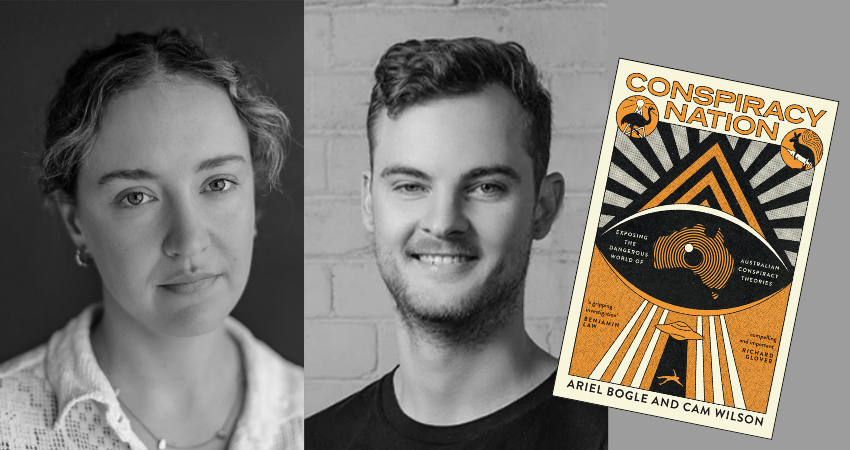Review: Conspiracy Nation, Ariel Bogle and Cam Wilson, Ultimo Press
The recent events in Victoria with the manhunt of (alleged) police killer Dezi Freeman, as well as continued protests in our cities, have again put conspiracy theorists into the spotlight. This book from journalists Ariel Bogle and Cam Wilson, who go down the Australian rabbit hole, is timely, then.
The ironically named Freeman is one of the so-called ‘sovereign citizens’ who, as they put it, ‘do not consent’ to the reaches of government, part of long-standing and widespread belief in ‘pseudolaw’ – misinformation using legal-sounding phrases that are ultimately junk, but with which advocates claim to be able to get around Australian law.
These pseudolaws are promoted by charlatans touring the country, often visiting from the US. They take from the Magna Carta, other ancient documents or whatever they think promotes ‘freedom’, and argue that because of some deficiencies in current law, citizens can argue their way out of the impositions of government in a court of law. (Even if these deficiencies in law exist, this doesn’t simply mean the whole legal system is redundant.)
‘Sovereign citizens’ hope to get out of speeding fines, paying taxes and the like, and judges are generally ‘bemused’ by their arguments, but these views turn deadly when citizens use guns to defend what they see as their rights. This happened in Queensland in 2022 when the Train family killed two policemen and a neighbour, and then themselves. The Trains were Christian premillennialists who had posted all manner of conspiracy theories online.
Sovereignty is just the tip of the iceberg. Theorists believe, amongst other things, that Harold Holt was kidnapped by the Chinese, the Port Arthur massacre was staged by the government to take guns away from citizens, vaccines contain microchips, Trump is waging a secret war against paedophiles, vapor trails contain mind-altering substances, 15-minute cities are designed to corral citizens when society collapses, Jesuits run ASIO, the Yes-vote was a ruse concocted by Jews, Ukraine has chemical weapons and the Russia-Ukraine war is fake. Then there is something ‘hard to follow’ about 5G. And they argue amongst themselves about favourite theories being hijacked by other theorists. (Protests against vaccinations and immigration are regularly infiltrated by neo-Nazis.)
Often conspiracy theories contain more than a whiff of racism. ‘Replacement’ theory responds to shifts in demographics by re-envisaging them as a global plot of ‘genocide’ against white people. This goes hand-in-hand with Christian nationalism, despite the irony that migrants are more likely to be Christian than the general population. Replacement theory was responsible for 70 people dead in Norway in 2021, for the Christchurch killings, and for numerous shootings across the US.
In Australia we have also seen reaction against the ‘safe schools’ program, which targeted bullying, especially of minority groups, with arguments that it is anti-family, anti-church, and another version of relativist ‘cultural Marxism’ (a phrase popular with the US far-Right). Part of this is a legitimate but perhaps misplaced concern over overt sexualisation, but just as often it’s about prejudice and intolerance of views that differ from the theorists’, as well as a simple lack of understanding and the unquestioning acceptance of third-hand accounts (a common problem with conspiracy theories online).
The wellness industry, too, can soon turn into conspiracy theorising when ‘unproven health ideas’ are coupled with misinformation about, say, fluoride in water. These conspiracy theories are merely a con. Now, in our influencer age, unproven ideas can suddenly be taken up by thousands of followers, who are lured by false and sometimes dangerous promises and unfounded fearmongering, made glitzy and subsequently lucrative by celebrities. In Australia, there is a surprising (or perhaps not surprising) turn of wellness celebrities promoting Trump’s neo-fascism, along with the nonsense of his secretary of health, RFK Jr.
The murders of policemen and innocent bystanders are some of the worst consequences, but conspiracy theories lead to broken and estranged marriages and families, online and in-person bullying and increasing fear amongst minority groups, not to mention the sheer waste of everyone’s time.
Bogle and Wilson are cautious about putting all of this down to the internet. They quote one American media analyst, who says that conspiracy theories aren’t increasing, it’s just easier for those already convinced to find information and connect with the like-minded. Still, say the authors, there is ‘something disturbing’ about fringe ideas becoming less fringe because of social media (and taken up by emboldened politicians and influencers who see an opportunity).
Conspiracy theories have, of course, gained traction because of the hardships of Covid lockdowns and general economic and societal anxiety. And they relate to understandable concerns about the reach and baroque perplexities of government and law, the lack of connection with nature, and the loss of comforting certainties about society (certainties that nevertheless in the past generally benefitted white males).

There is a lure for the powerless – conspiracy theories give their believers the power of (supposedly) knowing better than the general population, rather than just resigning themselves to life being chaotic, perplexing or just plain frustrating. There can be a susceptibility amongst Christians, which Christians might do well to resist, because of the belief within Christianity of a hidden world and veiled purposes. In this, they have common ground with the Gnostics, who think they know what’s really going on, but who the Church Fathers decided were, well, a bit wacky.
Nick Mattiske blogs on books at coburgreviewofbooks.wordpress.com and is the illustrator of Thoughts That Feel So Big.





